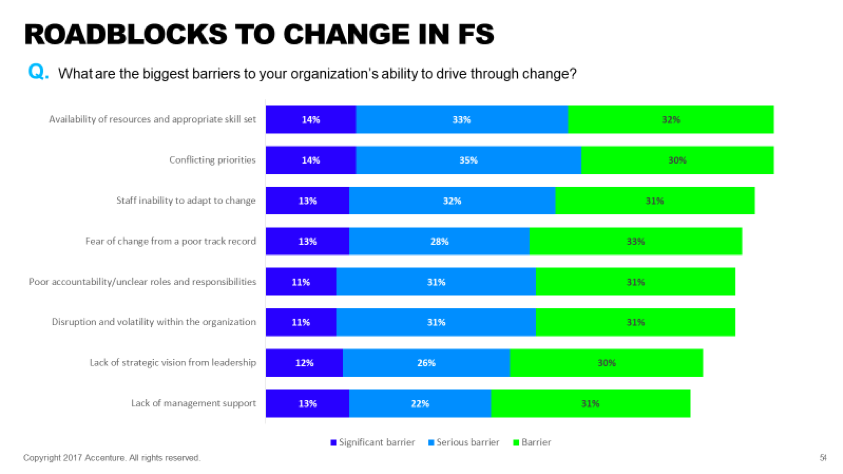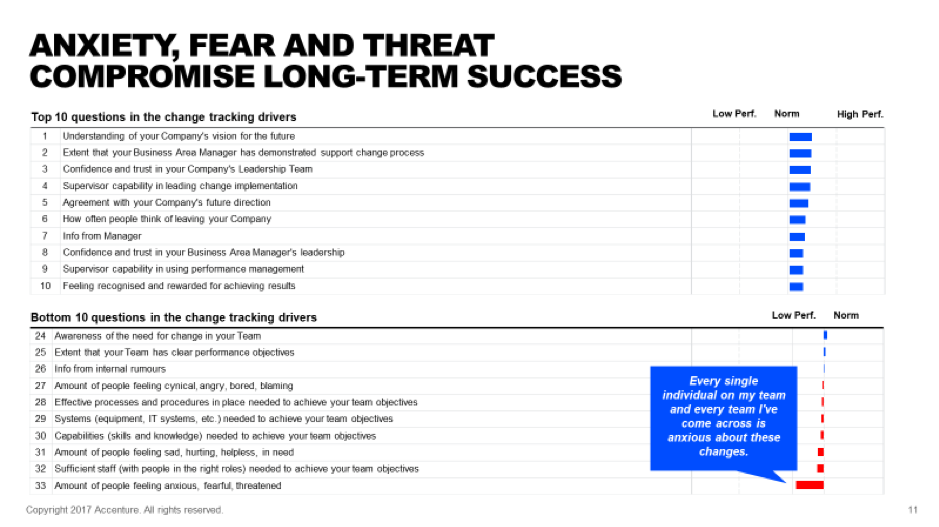Other parts of this series:
In the storms of disruption, it is very easy for even the most experienced crew to become frightened and lose its ability to set a new course ahead.
Financial services (FS) organisations recognise they must master constant change and agility to thrive in a rapidly evolving digital world. Yet, high levels of fear and anxiety in the workforce are undermining their transformational change efforts and performance.
Our research shows that the level of ‘fear, anxiety and threat’ the FS workforce feels is much higher than the average for other industries, primarily because of concerns regarding job losses. Since the financial crisis, many FS firms have focussed on cutting costs and reducing existing work, creating insecurity for the employees.
Drawing on data from our 2017 FS Change Survey, Transformation GPS, and FS Agility Index Study, we find that FS organisations are investing in their change capabilities and that the workforce is often aligned with the vision for the organisation and the necessity for change. Yet, leaders and workforce agree that fear and anxiety is the greatest inhibitor of change.
In our FS Change Survey, 74 percent of the 800 executives interviewed said staff inability to change and fear of change because of a poor track record was one of their greatest obstacles.
Our Transformation GPS analysis, based on a sample of 5,000 employees and managers, indicates that 85 percent of transformations that fail do so because of organisational dynamics, especially due to issues of fear and trust. The greatest negative inhibitor of change success in financial services is the amount of people feeling anxious, fearful and threatened:
The impact of fear on organisational performance and agility can be severe. According to our research, an organisation’s ability to realise the benefits of change declines significantly as levels of fear and anxiety rise.
Fear is a natural human response when threatened, whether real or perceived, and anxiety is the anticipation or recollection of threat. When we are fearful or anxious, our instinctive brain can take over and we react typically by fleeing, freezing or fighting. These could be helpful when faced with physical threat, but are decidedly unhelpful during periods of transformational change and when seeking greater agility and innovation.
In the workplace, fear and anxiety can be contagious, draining people of their motivation and imagination, diminishing their ability to think rationally about the situations at hand. People become less collaborative and creative, believing that failure will not be tolerated. Their views may narrow to reflect the orthodoxies of the organisation, and they will stop learning because they stop experimenting. Some may hoard information to protect their position, and conflict may flare up in teams. Heightened levels of stress over a long period can affect workers’ mental and physical wellbeing. For FS firms, this results in loss of productivity, an increase in absenteeism and difficulties in attracting and retaining top talent.
It is also nearly impossible to drive successful change when fear takes hold of a workplace. Several neuroscience studies show that it is difficult for an individual trapped in a fearful or anxious state of mind to learn new skills or patterns of behaviour. If such feelings are common across a workplace or a team, it can lead to slow or incomplete implementation of change, erosion of the benefits of change, or even failure to change at all.
In many ways, today’s FS leaders are akin to a captain of a large ship weathering an unexpected storm at sea. When the tall waves start coming in over the side of the ship, even the experienced crew start to worry and bicker. The captain’s job is to calm everyone down and bring them home safely.
This is not all doom and gloom. Accenture research such as our Reworking the Revolution study shows that this fear and anxiety co-exist with more positive views about the future—employees are excited about the opportunity to learn new skills and take advantage of new technologies in their work. Yet the required investment in their skills to give them relevance in the future and increase organisational agility and performance today has not been forthcoming in most businesses.
In my next post, I will explore the importance of building psychological safety in teams, by which financial services organisations can dispel fear and anxiety and mobilise the workforce to weather the storm of disruption.
To find out more about how fear impacts change in FS, please contact me here, or @andyyoungACN.
To learn more register to download: Fearless: How safety and trust can help financial services thrive even during disruption and transformational change













